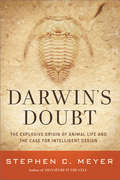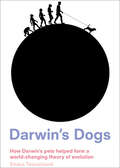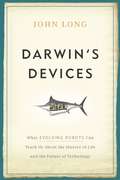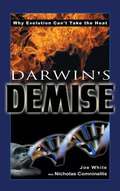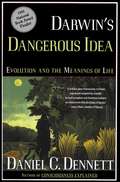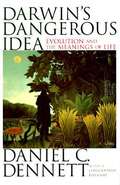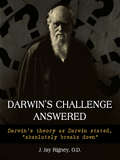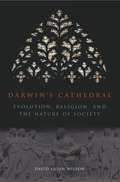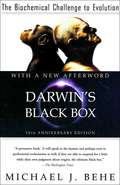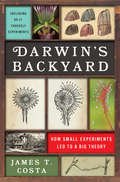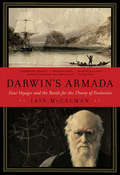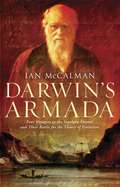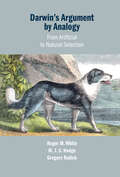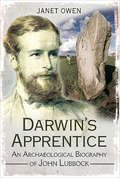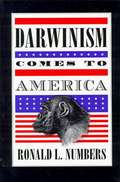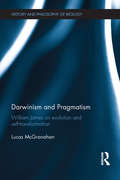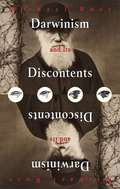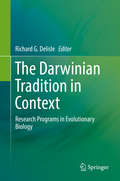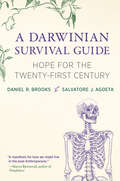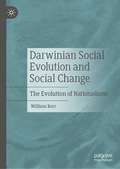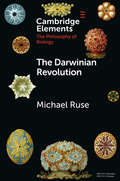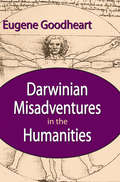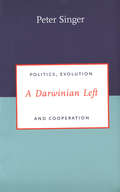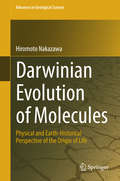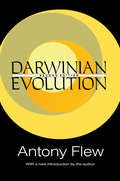- Table View
- List View
Darwin's Doubt: The Explosive Origin of Animal Life and the Case for Intelligent Design
by Stephen C. MeyerCharles Darwin knew that there was a significant event in the history of life that his theory did not explain. In what is known today as the "Cambrian explosion," 530 million years ago many animals suddenly appeared in the fossil record without apparent ancestors in earlier layers of rock. In Darwins Doubt Stephen C. Meyer tells the story of the mystery surrounding this explosion of animal life--a mystery that has intensified, not only because the expected ancestors of these animals have not been found, but also because scientists have learned more about what it takes to construct an animal. Expanding on the compelling case he presented in his last book, Signature in the Cell, Meyer argues that the theory of intelligent design--which holds that certain features of the universe and of living things are best explained by an intelligent cause, not an undirected process such as natural selection--is ultimately the best explanation for the origin of the Cambrian animals.
Darwin's Dogs: How Darwin's Pets Helped Form a World-Changing Theory of Evolution
by Emma TownshendIf you have ever looked at a dog waiting to go for a walk and thought there was something age-old and almost human about his sad expression, you&’re not alone; Charles Darwin did exactly the same. But Darwin didn&’t just stop at feeling that there was some connection between humans and dogs. English gentleman naturalist, great pioneer of the theory of evolution and incurable dog-lover, Darwin used his much-loved dogs as evidence in his continuing argument that all animals including human beings, descended from one common ancestor. From his fondly written letters home enquiring after the health of family pets to his profound scientific consideration of the ancestry of the domesticated dog, Emma Townshend looks at Darwin&’s life and work from a uniquely canine perspective.
Darwin's Devices: What Evolving Robots Can Teach Us About the History of Life and the Future of Technology
by John LongWhat happens when we let robots play the game of life? The challenge of studying evolution is that the history of life is buried in the past--we can't witness the dramatic events that shaped the adaptations we see today. But biorobotics expert John Long has found an ingenious way to overcome this problem: he creates robots that look and behave like extinct animals, subjects them to evolutionary pressures, lets them compete for mates and resources, and mutates their 'genes'. In short, he lets robots play the game of life. In Darwin's Devices, Long tells the story of these evolving biorobots--how they came to be, and what they can teach us about the biology of living and extinct species. Evolving biorobots can replicate creatures that disappeared from the earth long ago, showing us in real time what happens in the face of unexpected environmental challenges. Biomechanically correct models of backbones functioning as part of an autonomous robot, for example, can help us understand why the first vertebrates evolved them. But the most impressive feature of these robots, as Long shows, is their ability to illustrate the power of evolution to solve difficult technological challenges autonomously--without human input regarding what a workable solution might be. Even a simple robot can create complex behavior, often learning or evolving greater intelligence than humans could possibly program. This remarkable idea could forever alter the face of engineering, design, and even warfare. An amazing tour through the workings of a fertile mind, Darwin's Devices will make you rethink everything you thought you knew about evolution, robot intelligence, and life itself.
Darwin's Demise
by Nicholas Comninellis Joe WhiteFor people confused by the contradictory messages they hear from secular science and church teaching, evolution can be intimidating. The truth is that Darwin's ideas are based upon faulty science, and that creationists have solid evidence to support their claims. Finally, a brilliant defense of Genesis and the Bible's teaching about origins is waiting for those who are soon to understand how Darwinism is fraudulent faith masquerading as science. Authors Joe White and Nicholas Comninellis have a passion for truth, and for sharing it with students and their parents. In Darwin's Demise,they succeed in showing why real science is burning down the House of Darwin.
Darwin's Dangerous Idea
by Daniel C. DennettIn a book that is both groundbreaking and accessible, Daniel C. Dennett, whom Chet Raymo of The Boston Globe calls "one of the most provocative thinkers on the planet," focuses his unerringly logical mind on the theory of natural selection, showing how Darwin's great idea transforms and illuminates our traditional view of humanity's place in the universe. Dennett vividly describes the theory itself and then extends Darwin's vision with impeccable arguments to their often surprising conclusions, challenging the views of some of the most famous scientists of our day.
Darwin's Dangerous Idea: Evolution and the Meanings of Life
by Daniel Clement DennettDennett demonstrates the power of the theory of natural selection and shows how Darwin's idea transforms and illuminates our traditional view of our place in the universe.
Darwin’s Challenge Answered: Darwin’s theory as Darwin stated, “absolutely breaks down”
by J. Jay Rigney, O.D.Darwin's book The Origin of Species was published in 1859. On page 159 of his book Darwin states, “If it could be demonstrated that any complex organ existed, which could not possibly have been formed by numerous, successive, slight modifications, my theory would absolutely break down”. This book directly, specifically, decisively answers Darwin's Challenge. As a result Darwin's theory as Darwin himself stated, "absolutely breaks down". Dr. Jan Jay Rigney graduated from Northeastern State University in Tahlequah, Oklahoma in 1984. At the time of the writing of this book, he will have been in private practice Optometry for thirty-one years. While practicing Optometry, he has had the opportunity to daily, for over 35 years, observe the design, function, and intricate interworkings of the human eye.
Darwin's Cathedral: Evolution, Religion, and the Nature of Society
by David Sloan WilsonOne of the great intellectual battles of modern times is between evolution and religion. Until now, they have been considered completely irreconcilable theories of origin and existence. David Sloan Wilson's Darwin's Cathedral takes the radical step of joining the two, in the process proposing an evolutionary theory of religion that shakes both evolutionary biology and social theory at their foundations. The key, argues Wilson, is to think of society as an organism, an old idea that has received new life based on recent developments in evolutionary biology. If society is an organism, can we then think of morality and religion as biologically and culturally evolved adaptations that enable human groups to function as single units rather than mere collections of individuals? Wilson brings a variety of evidence to bear on this question, from both the biological and social sciences. From Calvinism in sixteenth-century Geneva to Balinese water temples, from hunter-gatherer societies to urban America, Wilson demonstrates how religions have enabled people to achieve by collective action what they never could do alone. He also includes a chapter considering forgiveness from an evolutionary perspective and concludes by discussing how all social organizations, including science, could benefit by incorporating elements of religion. Religious believers often compare their communities to single organisms and even to insect colonies. Astoundingly, Wilson shows that they might be literally correct. Intended for any educated reader, Darwin's Cathedral will change forever the way we view the relations among evolution, religion, and human society.
Darwin's Black Box: The Biochemical Challenge to Evolution
by Michael J. BeheThe groundbreaking, "seminal work" (Time) on intelligent design that dares to ask, was Darwin wrong? In 1996, Darwin's Black Box helped to launch the intelligent design movement: the argument that nature exhibits evidence of design, beyond Darwinian randomness. It sparked a national debate on evolution, which continues to intensify across the country. From one end of the spectrum to the other, Darwin's Black Box has established itself as the key intelligent design text -- the one argument that must be addressed in order to determine whether Darwinian evolution is sufficient to explain life as we know it. In a major new Afterword for this edition, Behe explains that the complexity discovered by microbiologists has dramatically increased since the book was first published. That complexity is a continuing challenge to Darwinism, and evolutionists have had no success at explaining it. Darwin's Black Box is more important today than ever.
Darwin's Backyard: How Small Experiments Led To A Big Theory
by James T. CostaDarwin’s Backyard goes beyond the portrait of Charles Darwin as a brilliant thinker to concentrate on him as a nimble experimenter delving into some of evolution’s great mysteries. James T. Costa takes readers on a journey from Darwin’s childhood through his voyage on the HMS Beagle where his ideas on evolution began. We then follow Darwin to Down House, his bustling home of forty years, where he kept porcupine quills at his desk to dissect barnacles, maintained a flock of sixteen pigeon breeds in the dovecote, and cultivated climbing plants in the study, and to Bournemouth, where on one memorable family vacation he fed carnivorous plants in the soup dishes. Using his garden and greenhouse, the surrounding meadows and woodlands, and even taking over the cellar, study, and hallways of his home-turned-field-station, Darwin tested ideas of his landmark theory of evolution with an astonishing array of hands-on experiments that could be done on the fly, without specialized equipment. He engaged naturalists, friends, neighbors, family servants, and even his children, nieces, nephews, and cousins as assistants in these experiments, which involved everything from chasing bees and tempting fish to eat seeds to serenading earthworms. From the experiments’ results, he plumbed the laws of nature and evidence for the revolutionary arguments of On the Origin of Species and his other watershed works. Beyond Darwin at work, we accompany him against the backdrop of his enduring marriage, chronic illness, grief at the loss of three children, and joy in scientific revelation. This unique glimpse of Darwin’s life introduces us to an enthusiastic correspondent, crowd-sourcer, family man, and, most of all, an incorrigible observer and experimenter. Includes directions for eighteen hands-on experiments, for home, school, yard, or garden.
Darwin's Armada: Four Voyages and the Battle for the Theory of Evolution
by Iain Mccalman"Sparkling . . . an extraordinary true-adventure story, complete with trials, tribulations and moments of exultation."--Kirkus Reviews, starred review Award-winning cultural historian Iain McCalman tells the stories of Charles Darwin and his staunchest supporters: Joseph Hooker, Thomas Huxley, and Alfred Wallace. Beginning with the somber morning of April 26, 1882--the day of Darwin's funeral--Darwin's Armada steps back and recounts the lives and scientific discoveries of each of these explorers, who campaigned passionately in the war of ideas over evolution and advanced the scope of Darwin's work.
Darwin's Armada: Four Voyagers to the Southern Oceans and Their Battle for the Theory of Evolution
by Iain MccalmanProving that good science (and good history) will make for a good story, McCalman (History, University of Sydney) presents a distinctive version of the beginnings of evolutionary biology during the 19th century. Weaving together the stories of naturalists Charles Darwin, Joseph Hooker, Thomas Huxley, and Alfred Wallace, the author shows how these men's scientific discoveries laid the groundwork for the theory of evolution, and how the support of Hooker, Huxley, and Wallace--the "armada" of the book's title--was essential to Darwin's efforts to persuade the scientific community that the theory of evolution was sound science. The book is especially good at showing how each scientist's ideas on evolution developed as a result of their field work, and how their similar field experiences in the Southern Hemisphere helped make them scientific allies. McCalman's engaging prose is complemented by 16 pages of illustrations, many of which are not the "usual suspects" found in books on Darwin or evolution. About as rip-roaring a science history as a reader could want, McCalman's book will have broad appeal. Annotation ©2010 Book News, Inc. , Portland, OR (booknews. com)
Darwin's Argument by Analogy: From Artificial to Natural Selection
by Roger M. White M.J.S. Hodge Gregory RadickIn On the Origin of Species (1859), Charles Darwin put forward his theory of natural selection. Conventionally, Darwin's argument for this theory has been understood as based on an analogy with artificial selection. But there has been no consensus on how, exactly, this analogical argument is supposed to work – and some suspicion too that analogical arguments on the whole are embarrassingly weak. Drawing on new insights into the history of analogical argumentation from the ancient Greeks onward, as well as on in-depth studies of Darwin's public and private writings, this book offers an original perspective on Darwin's argument, restoring to view the intellectual traditions which Darwin took for granted in arguing as he did. From this perspective come new appreciations not only of Darwin's argument but of the metaphors based on it, the range of wider traditions the argument touched upon, and its legacies for science after the Origin.
Darwin's Apprentice: An Archaeological Biography of John Lubbock
by Janet OwenThe fascinating story of Charles Darwin&’s friend, fellow scientist, and champion. Sir John Lubbock was an important Darwinist, witness to an extraordinary moment in the history of science and archaeology—the emotive scientific, religious, and philosophical debate which was triggered by the publication of Darwin&’s On the Origin of Species in 1859. Darwin&’s Apprentice looks at Lubbock&’s critical yet often overlooked role in the Darwinian campaign, including the ways in which Lubbock&’s archaeological and ethnographic collections shaped both his work and personal life. It offers an enlightening view not only of the beginnings of Darwinism, but of the scientific world of late nineteenth-century Britain.
Darwinism in America
by Ronald L. NumbersCompelling history of the legacy of Darwin's ideas in 19th and 20th century America.
Darwinism and Pragmatism: William James on Evolution and Self-Transformation (History and Philosophy of Biology)
by Lucas McGranahanCharles Darwin’s theory of natural selection challenges our very sense of belonging in the world. Unlike prior evolutionary theories, Darwinism construes species as mutable historical products of a blind process that serves no inherent purpose. It also represents a distinctly modern kind of fallible science that relies on statistical evidence and is not verifiable by simple laboratory experiments. What are human purpose and knowledge if humanity has no pre-given essence and science itself is our finite and fallible product? According to the Received Image of Darwinism, Darwin’s theory signals the triumph of mechanism and reductionism in all science. On this view, the individual virtually disappears at the intersection of (internal) genes and (external) environment. In contrast, William James creatively employs Darwinian concepts to support his core conviction that both knowledge and reality are in the making, with individuals as active participants. In promoting this Pragmatic Image of Darwinism, McGranahan provides a novel reading of James as a philosopher of self-transformation. Like his contemporary Nietzsche, James is concerned first and foremost with the structure and dynamics of the finite purposive individual. This timely volume is suitable for advanced undergraduate, postgraduate and postdoctoral researchers interested in the fields of history of philosophy, history and philosophy of science, history of psychology, American pragmatism and Darwinism.
Darwinism And Its Discontents
by Robert J. Richards Michael RusePresenting an ardent defence of Charles Darwin's theory of evolution, this book offers a clear and comprehensive exposition of Darwin's thinking. Michael Ruse brings the story up to date, examining the origins of life, the fossil record, and the mechanism of natural selection. Rival theories are explored, from punctuated equilibrium to human evolution (including the recently found 'hobbits', Homo floresiensis). The philosophical and religious implications of Darwinism are discussed, including a discussion of Creationism and its modern day offshoot, Intelligent Design Theory. Ruse draws upon the most recent discoveries, writing with a minimum of jargon in order to appeal to all readers, from professional biologists to those concerned that Darwinism is a naturalistic religion that is forced on school children despite their own Christian convictions. Openly revealing his own beliefs, Ruse presents readers with all the information and critical tools they need to make an informed decision on evolutionary theory.
The Darwinian Tradition in Context: Research Programs In Evolutionary Biology
by Richard G. DelisleIt is the main goal of this volume to put in context the Darwinian tradition by raising questions such as: How should it be defined? Did it interacted with other research programs? Where there any research programs whose developments were largely conducted independently of the Darwinian tradition? Contributors to this volume explicitly reflect upon the nature of the relationship between the Darwinian tradition and other research programs running in parallel. In the wake of the Synthetic Theory of Evolution which was constituted in the 1930s, 1940s, and 1950s, historians and philosophers of biology have devoted considerable attention to the Darwinian tradition, i. e. , linking Charles Darwin to mid-Twentieth-Century developments in evolutionary biology. Since then, more recent developments in evolutionary biology challenged, in part only or entirely, the heritage of the Darwinian tradition. Expectedly, this was followed by a historiographical "recalibration" by historians and philosophers towards other research programs and traditions part of evolutionary biology since Darwin's time. In order to acknowledge this shift, papers have been arranged along two main threads: Part I: The view that sees Darwinism as either originally pluralistic or acquiring such a pluralism through modifications and borrowings over time. Part II: The view blurring the boundaries between non-darwinian and darwinian traditions, either by holding that Darwinism itself was never quite as darwinian as previously thought, or that non-darwinian traditions took on board some darwinian components, when not fertilizing Darwinism directly. Between a Darwinism reaching out to other research programs and non-darwinian programs reaching out to Darwinism, the least that can be said is that this criss-crossing of intellectual threads blurs the historiographical field. This volume aims to open new thinking avenues about the development of evolutionary biology.
A Darwinian Survival Guide: Hope for the Twenty-First Century
by Daniel R. Brooks Salvatore J. AgostaHow humanity brought about the climate crisis by departing from its evolutionary trajectory 15,000 years ago—and how we can use evolutionary principles to save ourselves from the worst outcomes.Despite efforts to sustain civilization, humanity faces existential threats from overpopulation, globalized trade and travel, urbanization, and global climate change. In A Darwinian Survival Guide, Daniel Brooks and Salvatore Agosta offer a novel—and hopeful—perspective on how to meet these tremendous challenges by changing the discourse from sustainability to survival. Darwinian evolution, the world&’s only theory of survival, is the means by which the biosphere has persisted and renewed itself following past environmental perturbations, and it has never failed, they explain. Even in the aftermath of mass extinctions, enough survivors remain with the potential to produce a new diversified biosphere.Drawing on their expertise as field biologists, Brooks and Agosta trace the evolutionary path from the early days of humans through the Late Pleistocene and the beginning of the Anthropocene all the way to the Great Acceleration of technological humanity around 1950, demonstrating how our creative capacities have allowed humanity to survive. However, constant conflict without resolution has made the Anthropocene not only unsustainable, but unsurvivable. Guided by the four laws of biotics, the authors explain how humanity should interact with the rest of the biosphere and with each other in accordance with Darwinian principles. They reveal a middle ground between apocalypse and utopia, with two options: alter our behavior now at great expense and extend civilization or fail to act and rebuild in accordance with those same principles. If we take the latter, then our immediate goal ought to focus on preserving as many of humanity&’s positive achievements—from high technology to high art—as possible to shorten the time needed to rebuild.
Darwinian Social Evolution and Social Change: The Evolution of Nationalisms
by William KerrThis book introduces the value of a Darwinian social evolutionary approach to understanding social change. The chapters discuss several different perspectives on social evolutionary theory, and go on to link these with comparative and historical sociological theory, and two case-studies. Kerr brings together social change theory and theories on nationalism, whilst also providing concrete examples of the theories at work. The book offers a vision of rapprochement between these different areas of theory and study, and to where this could lead future studies of comparative history and sociology. As such, it should be useful to scholars and students of nationalism and social change, sociologists, political scientist and historians.
The Darwinian Revolution (Elements in the Philosophy of Biology)
by Michael RuseWhat is the Darwinian revolution and why is it important for philosophers? These are the questions tackled in this Element. In four sections, the topics covered are the story of the revolution, the question of whether it really was a revolution, the nature of the revolution, and the implications for philosophy, both epistemology and ethics.
Darwinian Misadventures in the Humanities
by Eugene GoodheartIn recent decades the humanities have been in thrall to postmodern skepticism, while Darwinists, brimming with confidence in the genuine progress they have made in the sciences of biology and psychology, have set their sights on rescuing the humanities from the ravages of postmodernism. In this volume, Eugene Goodheart attacks the neo-Darwinist approach to the arts and articulates a powerful defense of humanist criticism. E. O. Wilson, the distinguished Harvard biologist, has spoken of converting philosophy into science, substituting science for religion, and formulating a biological theory of literature and the arts in Consilence: The Unity of Knowledge. Goodheart demonstrates that Wilson's efforts, and those of his colleagues Richard Dawkins, Steven Pinker, and Daniel Dennett among others, have resulted in scientism rather than science. If, for example, Dawkins had contented himself in The Selfish Gene with the claim that Darwinism had made worthless other answers to the question of how we have evolved, he would have given offense only to creationists, but questions of meaning and purpose are of another order. Contemporary Darwinist critiques err in assuming that art and traditional criticism aspire to truths that can be codified in terms of scientific laws. If this were so, we would have to regard the speculations of Plato, Aristotle, Augustine, Montaigne, Shakespeare, and Rousseau as worthless. Goodheart exposes the philistinism of literary Darwinism, the bad faith and inverted fundamentalism of the Darwinian approach to religion, and the dangers of the eff ort to create a Darwinian ethical system. Taken together, Goodheart's arguments show that in moving beyond their area of competence, the neo -Darwinists commit an ideology, not a science.
A Darwinian Left
by Peter SingerIn this ground-breaking book, a renowned bioethicist argues that the political left must radically revise its outdated view of human nature. He shows how the insights of modern evolutionary theory, particularly on the evolution of cooperation, can help the left attain its social and political goals.Singer explains why the left originally rejected Darwinian thought and why these reasons are no longer viable. He discusses how twentieth-century thinking has transformed our understanding of Darwinian evolution, showing that it is compatible with cooperation as well as competition, and that the left can draw on this modern understanding to foster cooperation for socially desirable ends. A Darwinian left, says Singer, would still be on the side of the weak, poor, and oppressed, but it would have a better understanding of what social and economic changes would really work to benefit them. It would also work toward a higher moral status for nonhuman animals and a less anthropocentric view of our dominance over nature.
Darwinian Evolution of Molecules: Physical and Earth-Historical Perspective of the Origin of Life (Advances in Geological Science)
by Hiromoto NakazawaOn the basis of thermodynamic considerations and the Earth’s historical processes, this book argues the physical inevitability of life’s generation and evolution, i.e., Why did life generate? Why does life evolve? Following an introduction to the problem, the hypothesis “Darwinian Evolution of Molecules” is proposed, which explains how, when, and where life was instigated through successive chemical reactions and the survival of selected molecules. The individual processes described are all scientifically reasonable, being verifiable by experiment. The hypothesis is supported by extensive reference to the scientific literature published in academic journals, including some experimental reports from the author’s own research group. The readers of this book will learn that the decreasing temperature of the early Earth led to a reduction in its entropy, inducing the Earth’s materials to order, which entailed ordering of the light elements as organic molecules with subsequent further ordering (i.e., evolution) to systems that can be considered alive (i.e., life). Researchers and students, as well as the non-academic audience, interested in the interdisciplinary problem of the origin of life will find suggestions and possible approaches to the scientific and conceptual problems they may be facing.
Darwinian Evolution
by Antony FlewIn little more than a hundred years the evolutionary theory of Charles Darwin has conquered the thinking world. No other body of ideas has enjoyed such unrivaled success. But precisely because of its scientific status, Darwinism has sometimes been invoked to sustain other ideas and beliefs with a much less solid foundation. Darwinian Evolution is a study of the historical background of Darwin's ideas, of their logical structure, and of their alleged and actual implications.Flew explores the Scottish Enlightenment, an important and often neglected aspect of Darwin's intellectual background. He compares Darwin with such figures as Adam Smith, Thomas Malthus, and Karl Marx, emphasizing not the similarities, but the differences between the natural and social sciences. Flew argues that social science must do what natural science does not: take account of individual choice. He examines the creationist controversy in Britain and the United States and discusses the possibility of a human sociobiology.In his new introduction, Flew updates his book by discussing relevant works that have appeared since it was published thirteen years ago. He discusses two different tendencies among both social scientists and those who develop or promote social policies according to various findings in the social sciences: (1) to assume there is no such thing as human nature; and (2) to take no account of the possibility that differences between sets of individuals may be genetically determined. Flew maintains that both these tendencies violate Darwin's theory. Darwinian Evolution is an intriguing study that should be read by sociologists, biologists, philosophers, and all those interested in the impact of Darwin and his work.
